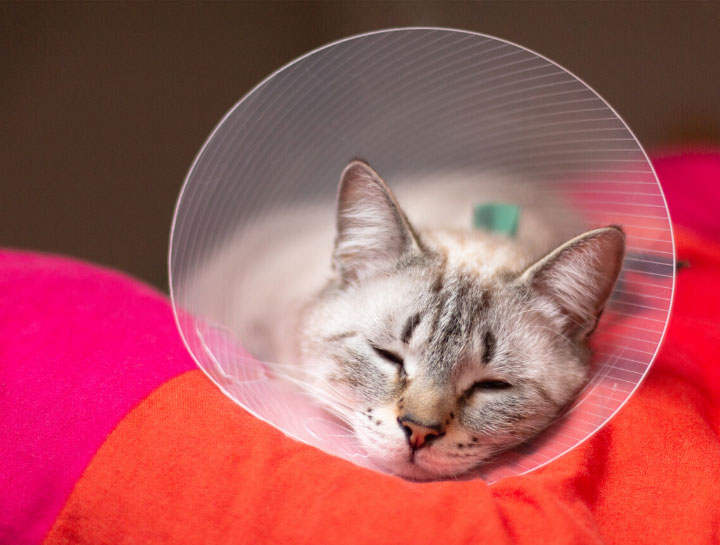Spay & Neuter Procedures
Help your pet live a long, healthy life.
Deciding whether to spay or neuter your cat or dog can be a difficult decision for some pet owners. Although the thought of your pet having surgery may seem scary, we’re here to assure you that spays and neuters are common surgeries that are safe, simple, and generally quick.
How can my pet benefit from sterilization?
Spaying and neutering help pets live long, healthy lives. Having pets sterilized while they’re young reduces their likelihood of developing certain infections and cancers. Plus, it combats overpopulation which, sadly, leads to the euthanasia of pets who cannot be placed in good homes.
Other common issues that spaying and neutering help prevent include:
- Benefits of Spaying (Females):
- No heat cycles – no mess and no attraction of male dogs. Risk of mammary gland tumors, ovarian and/or uterine cancer is reduced or eliminated, especially if done before the first heat cycle. Less desire to roam. Reduces or eliminates the risk of developing a pyometra, or life-threatening infection in the uterus. Reduces the number of unwanted animals. Helps dogs and cats live longer and healthier lives.
- Benefits of Neutering (Males):
- Reduces or eliminates the risk of spraying and/or marking. Less likely to roam, therefore less likely to be injured in fights or auto accidents. Risk of testicular cancer is eliminated, and decreases the incidence of prostate disease. Reduces the number of unwanted animals. Decreases aggressive behavior, including dog bites. Helps dogs and cats live longer, healthier lives.
Why do we keep your pet overnight after routine spay/neuter procedures?
It is our policy at Best Friends Animal Hospital to keep all pets that have routine spay/neuter/declaw procedures overnight at least one night at the hospital. We do this for several reasons, but the bottom line is that we want the best for them and believe this should be the standard of care.
One of the most important reasons is that we want to make sure each pet’s pain is adequately addressed. Although we have a standard pain management protocol for each procedure, pets are individuals and occasionally need more pain medication. The last thing we want is for your pet to be painful. We pride ourselves in being aggressive and attentive with pain management because studies have shown that patients experiencing pain actually have delayed healing. Pain management is not optional for our patients!
Second, we want to minimize complications from the procedure. One of the most life threatening potential complications from any of these procedures is bleeding. We keep them overnight to monitor them for any signs of bleeding, so we could address this complication as soon as possible. While life-threatening bleeding rarely occurs, it is a potential with any surgery, especially abdominal procedures. Most patients do not bother or lick their incision sites, but approximately 10% of the time, they do! If so, we like to identify and remedy this early, before sutures or stitches are removed.
Third, we want them to get a very good night’s rest. During anesthesia, they are not “sleeping” and are often pretty exhausted at the end of the day. We want to ensure they have a first restful night, and we also want you to rest easy and not worry about waking up several times during the night to check your furry kid!
Keeping pets overnight costs us more, because we have to pay for the facility and personnel to monitor them. It does not save us money to keep them overnight. But we believe this is the right thing to do for your pet and to minimize pain and complications. We want this high standard of care because they are our “best friends.”
Find more answers to questions about getting your pet spayed or neutered here, or you’d like to schedule an appointment, give us a call at (406) 255-0500 or request an appointment online.

